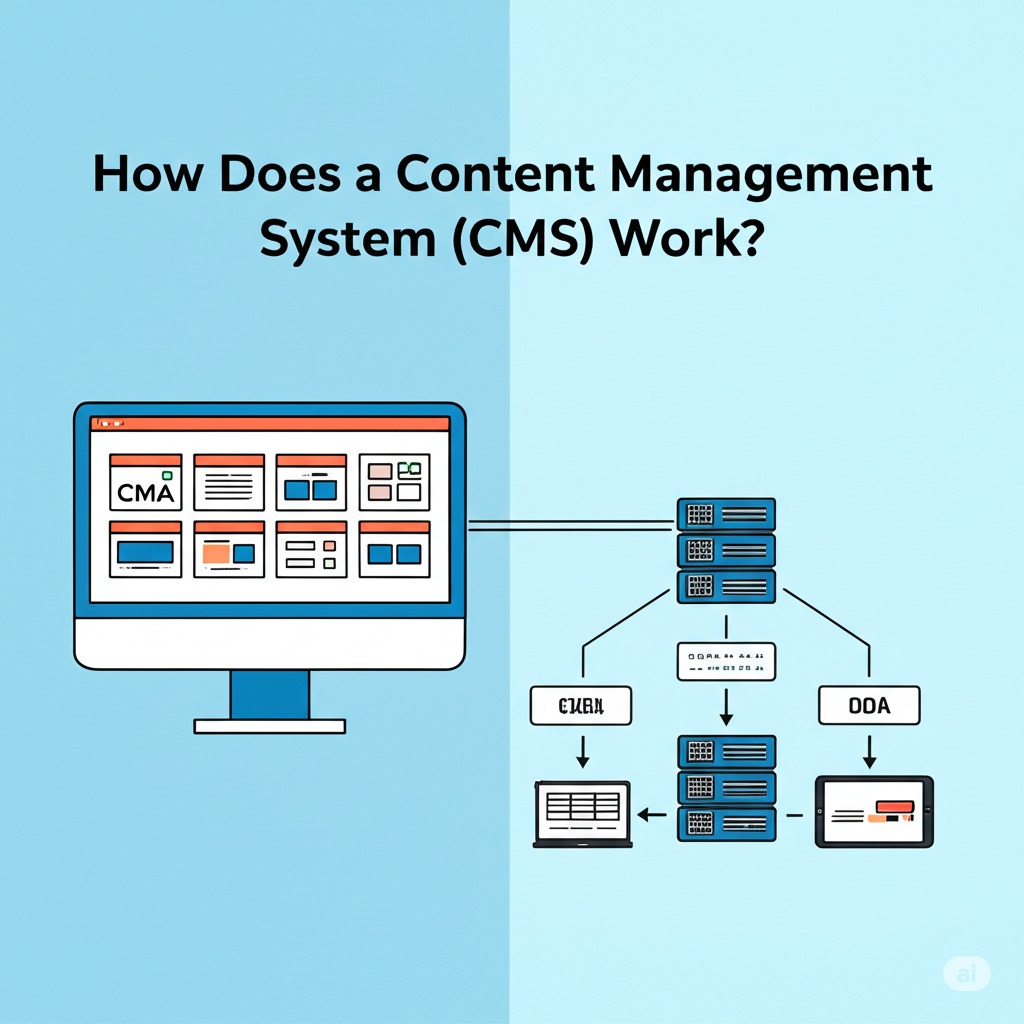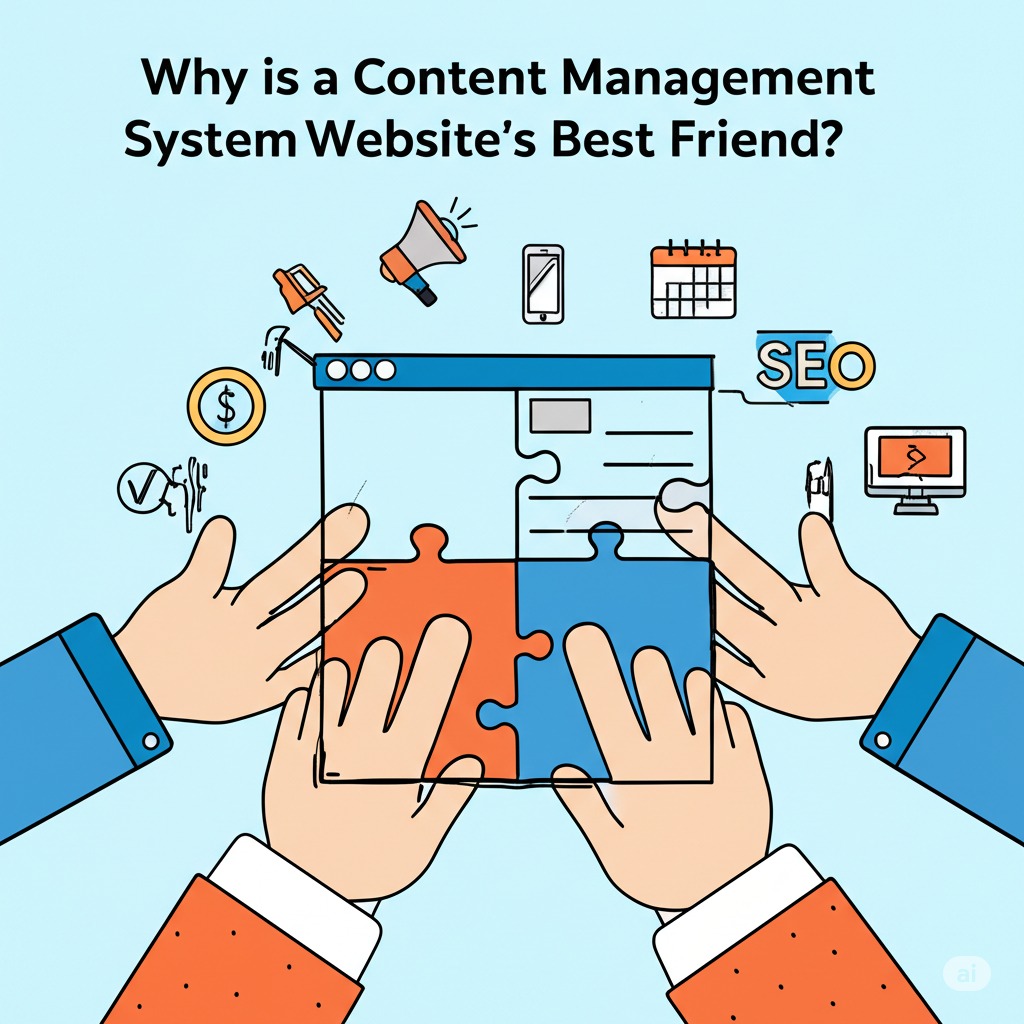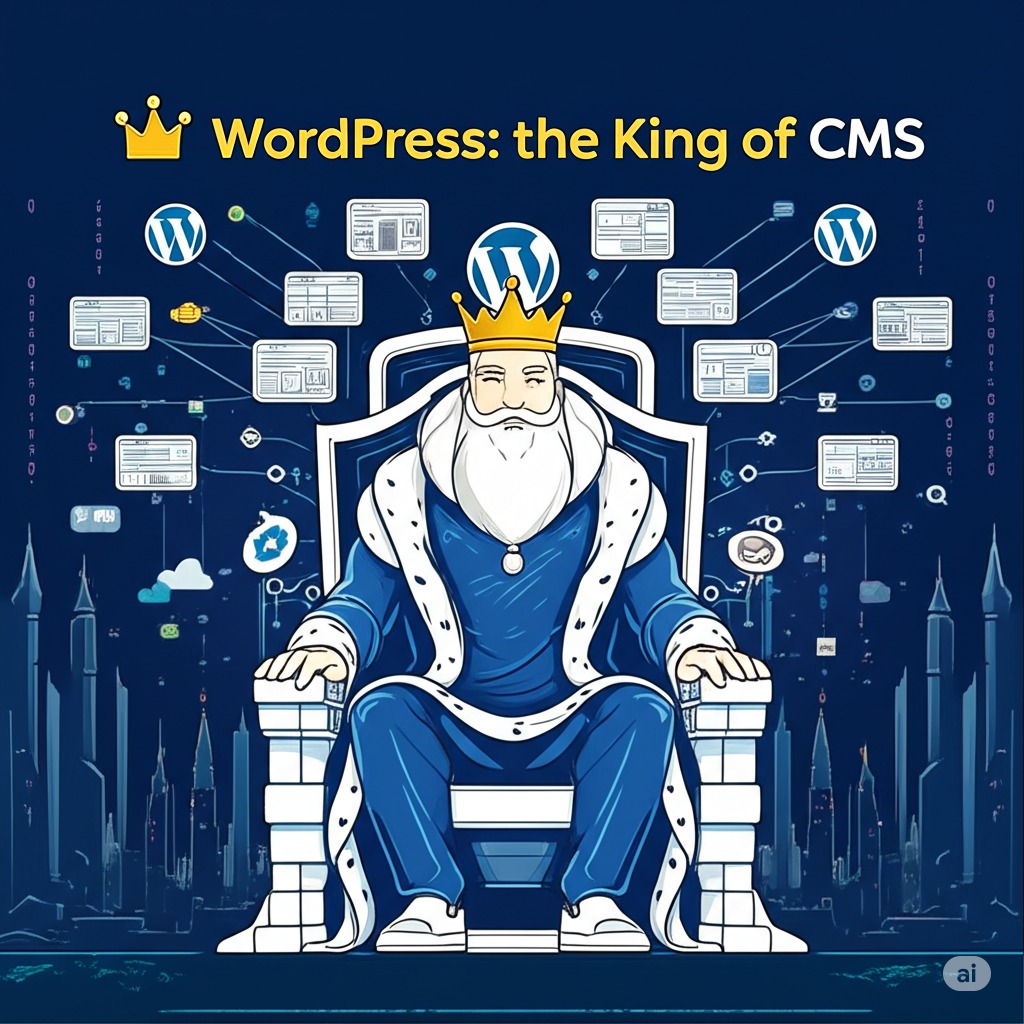Hey everyone! 👋 Have you ever wondered how those amazing websites you visit every day are made? How do people add new blog posts, change pictures, or update information without being a super-duper coder? Well, guess what? The secret sauce is often something called a Content Management System, or CMS for short!
Think of a CMS like a magical toolkit that helps you build and manage your website without needing to write a single line of complicated code. It’s like having a special remote control for your website, letting you change things around easily, just like you change channels on your TV! This post will tell you all about what a Content Management System is, why it’s so awesome, and introduce you to some popular ones that many people love to use.
Table of Contents
What is a Content Management System (CMS)?
Imagine you want to build a really cool treehouse 🌳. You could chop down trees, saw the wood, and nail everything together yourself. That’s like coding a website from scratch! It’s a lot of work, and you need to know exactly what you’re doing.

Now, imagine someone gives you a ready-made treehouse kit! It has all the pieces, clear instructions, and maybe even a special tool to put it all together. That’s what a Content Management System (CMS) is for websites!
A CMS is a special software that helps you:
- Create content: Write blog posts, add pictures, make new pages – all without touching complex code like HTML or CSS.
- Manage content: Organize all your stuff, like photos, videos, and articles, in one neat place.
- Store content: It keeps everything safe in a database, ready to be shown on your website.
- Modify content: Change words, swap pictures, update prices – super easy, just like editing a document on your computer.
It’s like having a digital assistant that handles all the technical bits of building and maintaining a website so you can focus on creating awesome things to share! 😊
How Does a Content Management System (CMS) Work?
Okay, let’s peek behind the curtain a little to see how this magic happens. When you build a website without a CMS, you usually write code for every single page. If you want to change one little thing, you have to find that code, change it, and then upload it to your web server. It’s a bit like writing a letter by hand every time you want to send one! 📝

A CMS works differently. It usually has two main parts:
- Content Management Application (CMA): This is the part you see and interact with. It’s the user-friendly dashboard where you can write, edit, upload, and organize your content. Think of it as your writing desk and filing cabinet. Most CMAs have a “What You See Is What You Get” (WYSIWYG) editor, which means you type and format text just like in a word processor, and it looks exactly the same on your website! No confusing code to worry about!
- Content Delivery Application (CDA): This is the “behind-the-scenes” part. When someone visits your website, the CDA takes all the content you’ve stored (text, images, videos) and puts it together using special templates and designs. Then, it delivers this nicely put-together page to your visitor’s web browser. It’s like the post office that makes sure your letters get delivered correctly! 💌
So, when you use a CMS, you’re not directly writing code for your website. Instead, you’re using the CMA to tell the CMS what content you want and how you want it to look. The CDA then does all the heavy lifting of turning your instructions into a live website! ✨
Why is a Content Management System (CMS) Your Website’s Best Friend?
Using a Content Management System (CMS) is like getting a superhero sidekick for your website. Here’s why it’s super beneficial:

- No Coding Needed (Mostly!): This is the biggest one! You don’t need to be a coding wizard to create a beautiful and functional website. This means more people can build their own websites without hiring expensive developers for every little change. Imagine being able to update your online store’s prices yourself! 🤑
- Easy to Update & Maintain: Websites are always changing. New blog posts, updated contact info, fresh pictures – a CMS makes these changes super simple. You just log in, make your edits, and hit “publish.” Boom! Instant update. This saves you a lot of time and money.
- Teamwork Makes the Dream Work: If you have a team working on a website, a CMS is a lifesaver. Multiple people can log in, create content, edit, and even review each other’s work. It’s like a shared online workspace where everyone can contribute without stepping on each other’s toes. 🤝
- Lots of Features with “Plugins” and “Extensions”: Most CMS platforms have a huge library of add-ons, kind of like apps for your phone. These are called plugins or extensions. Want to add a contact form? There’s a plugin for that! Need to optimize your website for Google search? There’s a plugin for that too! This lets you add cool features without any coding.
- SEO Friendly: SEO stands for Search Engine Optimization, which is all about making your website easy for Google and other search engines to find. Many CMS platforms have built-in tools or plugins that help you make your website more visible in search results, helping more people discover your awesome content! 📈
- Looks Good Everywhere: A good CMS often helps your website look great on any device, whether it’s a big computer screen, a tablet, or a tiny phone. This is called “responsive design,” and it’s super important nowadays! 📱💻
- Cost-Effective: While some premium themes or plugins might cost money, many CMS platforms themselves are free (like WordPress!). This can significantly reduce the initial cost of building a website compared to hiring someone to code everything from scratch.
Popular Content Management System (CMS) Examples
Now that you know how awesome Content Management Systems (CMS) are, let’s meet some of the popular ones that many people use to build their online homes! Each one is a bit different and suited for different kinds of websites.
WordPress: The King of Content Management Systems (CMS)
👑 WordPress is like the superstar of CMS platforms. You’ve probably visited tons of websites powered by WordPress without even realizing it! It’s super popular, powering over 40% of all websites on the internet! That’s a lot of websites!

What makes it special?
- Two flavors: There’s WordPress.org (where you download the software and host it yourself – more control!) and WordPress.com (where they host it for you – super easy to start!). Most people talk about WordPress.org when they say “WordPress.”
- Super flexible: You can build almost any type of website with WordPress:
- Blogs (of course!) ✍️
- Business websites 🏢
- Online stores (using a plugin called WooCommerce) 🛍️
- Portfolios 🎨
- News websites 📰
- Themes and Plugins Galore: WordPress has thousands of free and paid “themes” (which are like pre-designed outfits for your website) and “plugins” (those add-on features we talked about). This means you can customize your website endlessly!
- Huge Community: Because it’s so popular, if you ever get stuck, there are tons of tutorials, forums, and helpful people online ready to assist you.
Who uses it?
Many famous websites use WordPress, from small blogs to big companies and news outlets like The New Yorker and BBC America.
Shopify: Your Online Store’s Content Management System (CMS) Sidekick
🛒 If your main goal is to sell things online, then Shopify is your go-to Content Management System (CMS). It’s built specifically for e-commerce, making it super easy to set up an online store.

What makes it special?
- All-in-one solution: Shopify handles everything for your online store: product listings, shopping carts, secure payments, shipping tools, and even marketing. You don’t need to worry about hosting or security updates – they take care of it all.
- User-friendly: It has a very easy-to-use interface, even if you’re a complete beginner. You can drag and drop elements to design your store.
- Built for sales: Features like abandoned cart recovery, discount codes, and analytics are all geared towards helping you sell more.
- App store: Just like with WordPress, Shopify has an app store where you can find extra features to extend your store’s functionality.
Who uses it?
Many small and large businesses use Shopify to power their online shops, like Gymshark and Kylie Cosmetics.
Wix & Squarespace: Easy-Peasy Content Management Systems (CMS)
🖼️ Wix and Squarespace are fantastic Content Management Systems (CMS) if you want to build a beautiful website quickly and easily, especially if you’re not very tech-savvy. They are known as “website builders” because they give you all the tools in one place.

What makes them special?
- Drag-and-drop editors: This is their superpower! You can simply drag elements (like text boxes, images, buttons) onto your page and drop them exactly where you want them. It’s incredibly visual and intuitive.
- Stunning templates: Both offer a wide variety of professionally designed templates that look amazing right out of the box. You just pick one you like and start adding your content.
- Hosting included: You don’t need to find a separate hosting provider; it’s all part of the package.
- Great for portfolios and small businesses: They are very popular with artists, photographers, small businesses, and anyone who wants a stylish online presence without a lot of fuss.
Who uses them?
Many creative professionals and small businesses use Wix and Squarespace. For instance, Und NY uses Wix, and Darren Booth uses Squarespace for his portfolio.
Drupal & Joomla: Powerful Content Management Systems (CMS) for Big Ideas
⚙️ If you’re looking to build something really big and complex, like a large university website or a government portal, then Drupal and Joomla might be the Content Management Systems (CMS) you’re looking for. They are very powerful and flexible, but they do require a bit more technical know-how.

What makes them special?
- Highly customizable: Developers love them because you can customize almost everything. If you have a unique idea for a website, these platforms can probably handle it.
- Scalability: They are built to handle a lot of traffic and a huge amount of content, making them great for growing websites.
- Strong security: They are known for their robust security features, which is crucial for large organizations.
- Large communities: Like WordPress, they have strong communities of developers and users who contribute to their development and offer support.
Who uses them?
The Economist and UNICEF use Drupal for their websites, showing just how powerful and reliable it is for large-scale operations. Nintendo has also been known to use Joomla!
Choosing the Right Content Management System (CMS)
With so many awesome Content Management Systems (CMS) out there, how do you pick the right one for you? It’s like choosing the right pair of shoes – you need to think about what you’ll be doing with them! Here are some questions to ask yourself:

- What kind of website do you want to build?
- Just a simple blog or personal website? WordPress.com or a simple plan on Wix/Squarespace might be perfect.
- An online store? Shopify is a top contender.
- A complex business site with unique features? WordPress.org, Drupal, or Joomla could be good.
- How comfortable are you with technology?
- Prefer drag-and-drop and no code? Wix or Squarespace are super friendly.
- Okay with a bit of a learning curve for more power? WordPress.org is a great middle ground.
- Love diving into technical details or have a developer friend? Drupal or Joomla give you immense control.
- What’s your budget?
- Some CMS platforms are free (like the WordPress.org software), but you’ll need to pay for hosting and a domain name.
- All-in-one builders like Wix and Squarespace have monthly fees that cover everything.
- Shopify has a monthly fee based on your store’s needs.
- Do you need specific features?
- E-commerce capabilities?
- Membership areas?
- Forums?
- Think about what your website needs to do, and then check if your chosen CMS (or its plugins/apps) can do it.
Don’t worry too much about making the “perfect” choice right away. Many CMS platforms are flexible, and you can always learn and grow with them!
Conclusion: Your Website, Simplified with a CMS
So there you have it! Content Management Systems (CMS) are truly incredible tools that have made building and managing websites accessible to pretty much everyone. Gone are the days when you needed to be a programming genius to have an online presence. With a CMS, you can focus on what really matters: creating amazing content, connecting with your audience, or selling your cool products.
Whether you’re starting a personal blog, launching a small business, or dreaming up a huge online platform, there’s a CMS out there that’s just right for you. They empower you to take control of your digital space and share your voice with the world, no complicated code required!
Did you find this post helpful? Liked it? Disliked it? Let me know in the comments below! And don’t forget to share this guide with anyone who wants to unlock their website superpowers on social media or in your online groups! Your friends will thank you for making website building easy! 😊
You can check our other articles:
External Citation URLs:


